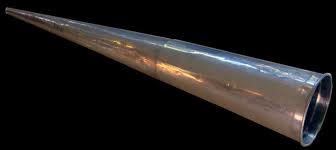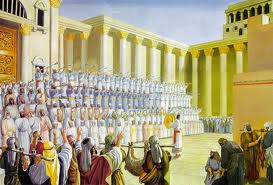
Answering Trumpets
With sacred song and thanksgiving the worshipers celebrated this occasion. A little before the feast was the Day of Atonement, when, after confession of their sins, the people were declared to be at peace with Heaven. Thus the way was prepared for the rejoicing of the feast. "O give thanks unto the Lord; for He is good: for His mercy endureth forever" (Psalm 106:1) rose triumphantly, while all kinds of music, mingled with shouts of hosanna, accompanied the united singing. The temple was the center of the universal joy. Here was the pomp of the sacrificial ceremonies. Here, ranged on either side of the white marble steps of the sacred building, the choir of Levites led the service of song. The multitude of worshipers, waving their branches of palm and myrtle, took up the strain, and echoed the chorus; and again the melody was caught up by voices near and afar off, till the encircling hills were vocal with praise.

At night the temple and its court blazed with artificial light. The music, the waving of palm branches, the glad hosannas, the great concourse of people, over whom the light streamed from the hanging lamps, the array of the priests, and the majesty of the ceremonies, combined to make a scene that deeply impressed the beholders. But the most impressive ceremony of the feast, one that called forth greatest rejoicing, was one commemorating an event in the wilderness sojourn.
At the first dawn of day, the priests sounded a long, shrill blast upon their silver trumpets, and the answering trumpets, and the glad shouts of the people from their booths, echoing over hill and valley, welcomed the festal day. Then the priest dipped from the flowing waters of the Kedron a flagon of water, and, lifting it on high, while the trumpets were sounding, he ascended the broad steps of the temple, keeping time with the music with slow and measured tread, chanting meanwhile, "Our feet shall stand within thy gates, O Jerusalem." Psalm 122:2.
He bore the flagon to the altar, which occupied a central position in the court of the priests. Here were two silver basins, with a priest standing at each one. The flagon of water was poured into one, and a flagon of wine into the other; and the contents of both flowed into a pipe which communicated with the Kedron, and was conducted to the Dead Sea. This display of the consecrated water represented the fountain that at the command of God had gushed from the rock to quench the thirst of the children of Israel. Then the jubilant strains rang forth, "The Lord Jehovah is my strength and my song;" "therefore with joy shall ye draw water out of the wells of salvation." Isaiah 12:2, 3.
DA 448, 449
